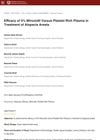 1 citations,
May 2023 in “Prospects in Pharmaceutical Sciences”
1 citations,
May 2023 in “Prospects in Pharmaceutical Sciences” New cytokine-targeted therapies show promise for treating alopecia areata.
[object Object]  238 citations,
November 2016 in “Journal of The American Academy of Dermatology”
238 citations,
November 2016 in “Journal of The American Academy of Dermatology” Tofacitinib is effective and safe for severe hair loss, but full regrowth is less likely after 10 years of hair loss.
 139 citations,
November 2016 in “Journal of the American Academy of Dermatology”
139 citations,
November 2016 in “Journal of the American Academy of Dermatology” Tofacitinib helped regrow hair in most adolescents with alopecia areata, but more research is needed.
 27 citations,
May 2007 in “Archives of dermatological research”
27 citations,
May 2007 in “Archives of dermatological research” Diphencyprone treatment increases CD8 lymphocytes in the scalp, which is associated with hair regrowth in alopecia areata patients.
 24 citations,
June 2016 in “Acta dermato-venereologica”
24 citations,
June 2016 in “Acta dermato-venereologica” Tofacitinib helped a young woman's severe hair loss and arthritis but not her plaque psoriasis.
9 citations,
January 2019 in “International Journal of Trichology” Combining calcipotriol with mometasone is more effective for treating alopecia areata than using mometasone alone.
9 citations,
July 2016 in “JAAD case reports” Denosumab treatment for osteoporosis can cause hair loss.
[object Object]  3 citations,
January 2015 in “Nasza Dermatologia Online”
3 citations,
January 2015 in “Nasza Dermatologia Online” Some treatments for autoimmune hair loss work, but JAK inhibitors like tofacitinib are promising for regrowth.
 July 2023 in “The Egyptian Journal of Hospital Medicine ”
July 2023 in “The Egyptian Journal of Hospital Medicine ” The conclusion is that emotional support and a variety of treatments are important for alopecia areata, but more research is needed.
 December 2022 in “Rossijskij žurnal kožnyh i veneričeskih boleznej”
December 2022 in “Rossijskij žurnal kožnyh i veneričeskih boleznej” New treatments for child hair loss due to immune issues are effective but not yet officially approved.
September 2021 in “Ukraïnsʹkij žurnal medicini, bìologìï ta sportu” PRP treatment reduces inflammation and increases interleukin-10 in alopecia areata patients.
 184 citations,
February 2015 in “EBioMedicine”
184 citations,
February 2015 in “EBioMedicine” A patient with Alopecia Areata had complete hair regrowth after using the drug baricitinib.
 71 citations,
March 2009 in “Seminars in cutaneous medicine and surgery”
71 citations,
March 2009 in “Seminars in cutaneous medicine and surgery” Alopecia areata can cause unpredictable hair loss, and treatments like corticosteroids and minoxidil may help but have varying side effects.
 70 citations,
April 2016 in “Experimental Dermatology”
70 citations,
April 2016 in “Experimental Dermatology” A patient with alopecia areata regrew hair after taking tofacitinib and showed changes in certain blood and skin markers.
 16 citations,
November 2005 in “Journal of Investigative Dermatology Symposium Proceedings”
16 citations,
November 2005 in “Journal of Investigative Dermatology Symposium Proceedings” Blocking interferon-gamma helps prevent and treat hair loss in Alopecia Areata.
8 citations,
January 2013 in “European Journal of Dermatology” Alitretinoin may help treat alopecia areata.
 6 citations,
March 2016 in “Scandinavian journal of immunology”
6 citations,
March 2016 in “Scandinavian journal of immunology” Janus kinase inhibitors show promise in treating alopecia areata but need more safety research.
 August 2024 in “Clinical Cosmetic and Investigational Dermatology”
August 2024 in “Clinical Cosmetic and Investigational Dermatology” Upadacitinib and narrowband UVB effectively treated a child's vitiligo and alopecia areata.
 December 2023 in “Dermatology and therapy”
December 2023 in “Dermatology and therapy” Japanese patients and physicians often disagree on the severity of Alopecia Areata and treatment satisfaction, needing better communication and treatments.
March 2017 in “Current dermatology reports” Topical JAK inhibitors can effectively treat alopecia areata and vitiligo by modulating immune responses.
 62 citations,
October 2016 in “Dermatologic Therapy”
62 citations,
October 2016 in “Dermatologic Therapy” PRP more effective than minoxidil 5% for treating alopecia areata.
53 citations,
July 2018 in “Drug design, development and therapy” Janus kinase inhibitors show promise in treating alopecia areata but need better topical formulations.
12 citations,
July 2012 in “Journal of cutaneous medicine and surgery” Adalimumab was safe but mostly ineffective for severe alopecia areata.
 3 citations,
February 2022 in “Rheumatology”
3 citations,
February 2022 in “Rheumatology” Baricitinib was effective in treating a patient with dermatomyositis and hair loss.
 1 citations,
February 2024 in “JEADV. Journal of the European Academy of Dermatology and Venereology/Journal of the European Academy of Dermatology and Venereology”
1 citations,
February 2024 in “JEADV. Journal of the European Academy of Dermatology and Venereology/Journal of the European Academy of Dermatology and Venereology” Baricitinib effectively promotes long-term hair regrowth in alopecia areata patients.
1 citations,
May 2017 in “InTech eBooks” New treatments focusing on immune pathways show promise for stubborn hair loss.
 December 2024 in “Pakistan Armed Forces Medical Journal”
December 2024 in “Pakistan Armed Forces Medical Journal” PRP is more effective than Minoxidil for treating alopecia areata.
 June 2024 in “Indian Dermatology Online Journal”
June 2024 in “Indian Dermatology Online Journal” Topical tofacitinib is effective and safe for treating alopecia areata.

Baricitinib quickly improved severe alopecia areata, with almost total hair regrowth in three months.
 66 citations,
June 2021 in “Journal of The American Academy of Dermatology”
66 citations,
June 2021 in “Journal of The American Academy of Dermatology” Baricitinib is effective and safe for treating severe alopecia areata.






















